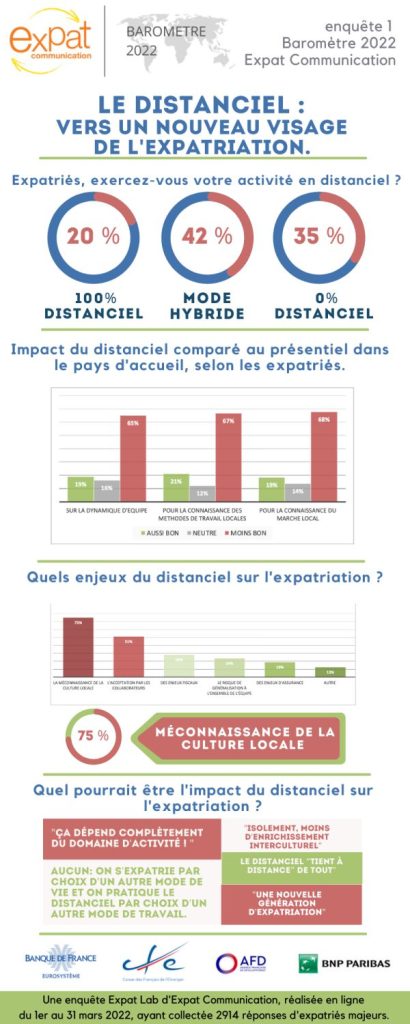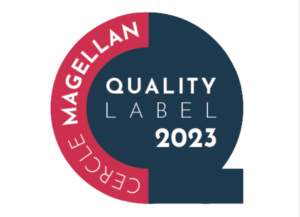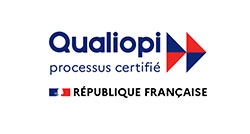Results Survey N°1 : Working from home : a revolution for expatriation ?
You are a company and want to know more about the barometer board?
Working from home: a revolution for expatriation?
This first survey of the Expat Communication 2022 Barometer raises the issue of remote work and its possible impact on expatriation.
Many thanks to the expatriates who have contributed to the analysis with their numerous high-quality statements.
The results of this survey, to which nearly 3000 expatriates have answered, allow us to measure the reality and complexity of the matter today, in March 2022.
The pandemic that struck the world two years ago led to an urgent adaptation of the work organization.
Expatriation, the motives From the generalisation of remote work or the opposite, the reasons for going abroad that motivate this choice of life and the issues that arise from a new organisation of work, it is clear that a change is taking place. It is difficult to say whether it is temporary, widespread or not.
You can also listen to the survey results on the following radio stations:
Stéréochic, la radio des Français dans le monde, listen to the podcast
RFI “Vivre ailleurs” rubric, listen to the podcast
What do we mean by working remotly?
First of all, let’s remember that these notions are emerging and that the vocabulary is groping around. Between telework, remote, commuting … it is sometimes difficult to find one’s way. Here we will remember that telework is done from home.
Working remotely implies for us to live in a country different from the one in which we work. Finally, in this article, remote includes all forms of virtual work.
Why move abroad?
The motives for moving abroad were expressed by expatriates at the beginning of the survey. Expatriation is above all a choice of human, family and cultural adventure for 41% of expatriates surveyed. “We go abroad to explore another way of life and we practice remote working to choose another way of working.”
"We expatriate ourselves by choosing another way of life and we work on remote to choose another way of working.”
The first observation is that the majority of expatriates do not work on remote. Only 20% say they work 100% remotely, while 35% do not work remotely at all. Only 42% mix the two: face-to-face and remote working. This is the hybride mode. However, this work organization is not applicable to all professions. Some professions can only be done in person. “I am a cook” says an expatriate. I don’t feel concerned by remote work…

Which jobs are suitable for distance work?
According to the responses to this survey, the jobs that would appear to be the easiest to undertake remotely areIT jobs and jobs in the consulting, coaching or training sector. They score 3.8 out of 5 in terms of feasibility of remote work. The lowest scores were obtained by the health professions (2.6) and team management (2.8). This is because being remote also has an impact on integration into the team, knowledge of local working methods and market knowledge.
The “moments of inforal exchange are just as important” for getting to know people, especially when working in a culturally different environment.
What is the major challenge of remote working?
Lack of knowledge of the local culture is clearly the biggest challenge of remote working. Nearly 75% see a considerable loss in being only remote. They mention the“loss of meaning, because learning is done face-to-face” or a lack of “integration into the team, less fluid communication, the atmosphere is colder in video”. Some feel that in their job, it is necessary “to be on the spot and see the people”. You get a lot of information off-line that you don’t get on Zoom. Team dynamics are very different in remote work for 65% of respondents. Only 19% felt that it did not change that much, and 16% remained neutral. It is therefore clear that links are more difficult to create when you are permanently away.
Integration also takes place outside working hours. Knowledge of local working methods is also more difficult to grasp remotely for 67% of the panel. Working with others means meeting to exchange working methods and “seeing each other in action”. This also explains why 68% say that distance learning cannot replace face-to-face learning to understand the workings of the local market. “Face to face” is necessary.
The impact of remote working on expatriation, according to expatriates.
The answers are as diversified as the profiles in the survey. For some people, it is a ” disaster ” and has had a ” negative impact “. Expatriation is the opposite of remote work working. It is necessary to know the culture, to be completely integrated into the host country in order to understand it and have a human relationship with one’s colleagues and team. This level of exchange cannot be achieved from distance.
For others, and in particular for those who already work remotely, this will be positive. There will be more and more people who will want to begin an expatriation to choose their place to live. A “new generation of expatriation” will emerge. Today, it is necessary to find one’s marks in a world of work that is in full evolution after the covid era. The visions of expatriates, companies and host countries must converge towards a balance that takes many parameters into account. Companies and employees will move forward to define the situations in which expatriation remains essential and the cases in which distance becomes counter-productive. The territories are reconsidering their attractiveness. And we are all learning to deal with these new factors of freedom.
The detailed results of this survey are reserved for the members of the Expat Communication Barometer Board.
And after expatriation?
One thing is certain, whatever form expatriation takes, there are some comebacks to be managed! This is an integral part of expatriation, but it is not always well experienced, nor even prepared or anticipated. This is the theme of our survey this month: “the return from expatriation, what are the issues”?
Whether you have already returned, are preparing your bags or whether it is not a topic on the agenda, we are interested in your opinions.
Take the current survey
The questionnaires are available in French or English. This link is accessible from your computer, tablet or phone.
Duration of the questionnaire: about 5 min
Your answers are treated confidentially, and if you wish to receive the results directly and answer our future surveys, you will be redirected at the end of the questionnaire to a second link to guarantee the anonymity of your answers to our survey.
Your participation is essential, thank you in advance for taking time to respond.
The board members of the Expat Communication 2022 Barometer.












Distributors of the Expat Communication Barometer.

Sabine Garnier-Posez
After studies and a professional career in economics and accounting, Sabine expatriated with her family, first to Morocco, Brazil, Germany and is now in Dubai, United Arab Emirates. Sabine joined Expat Communication as Project Manager of the Expatriation Barometer
Be part of the panel
If you would like to have access to the infographics and survey results, join the Barometer Board or contact us via the link below for more information:
On the same topic:

The tour of expatriation in 2024

The faces of expatriation in 2023 – Excellence and vulnerability

Baromètre Expat Communication 2023 : White paper

The impact of expatriation on daily life – results of survey n°3 Barometer Expat Communication 2023

Career and Expatriation: Expat Communication 2023 Barometer, results survey N°2




